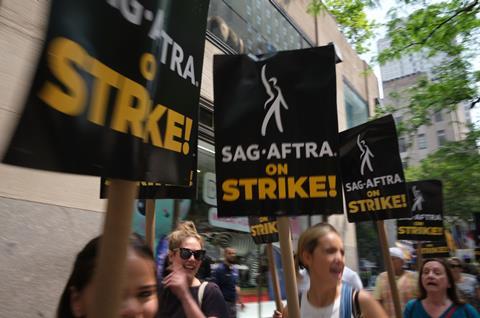
SAG-AFTRA confirmed on Saturday that it was weighing up a “last, best and final offer” from the studios and streamers as the actors strike entered its 114th day.
Saturday’s development extended the narrative from last week that the work stoppage was in its final stages as the parties seek a way to agree on a new three-year TV and theatrical deal.
“We received an offer today from the AMPTP, which they characterized as their ‘Last, Best, and Final Offer’,” said a SAG-AFTRA spokesperson.
“We are reviewing it and considering our response within the context of the critical issues addressed in our proposals.”
Minimum rates, bonus structure and regulation of AI have been the chief stumbling blocks between the union and Alliance Of Motion Picture and Television Producers (AMPTP).
Hollywood and the rest of the global film industry has been monitoring events and an air of cautious optimism prevailed last week as the two sides of negotiators engaged in talks without the media leaks or walkouts that have come to embody much of the tone of the 2023 strike.
Back in late September AMPTP issued their “best and final offer”. The parties would continue talks into a tumultuous October before they broke down on October 11 as goodwill appeared to be crumbling and AMPTP issued a statement saying the gap between the two sides was too great.
It emerged the union had proposed AMPTP members pay 57 cents per global subscriber each year as part of a bonus structure. AMPTP claimed the move was a levy and would cost its members around $800m annually. The union said the number was inflated and disputed the “levy” label. It is thought to be closer to $500m.
A short while later a cabal of A-listers led by George Clooney agitated for a resolution when they proposed removing the cap on membership dues as a measure to bring in more than $50m a year to the union and $150m over three years, as well as a revised residuals formula designed to pay the lowest-earning members first.
SAG-AFTRA responded to that “generous concept” and said parts of the proposal were most likely illegal under federal law.

























1 Readers' comment